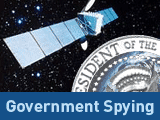U.S. Civil Rights Commission Examines NSA Warrantless Spying, ACLU Urges Full Hearings, Thorough Inquiry
FOR IMMEDIATE RELEASE
Contact: Media@dcaclu.org
WASHINGTON - The American Civil Liberties Union today appeared before the United States Commission on Civil Rights as that body, for the first time ever, took up the issue of the warrantless domestic spying program conducted by the National Security Agency. The commission, by statute, has an oversight function and duty to appraise the federal government’s administration of justice.

"We commend the commission for holding this briefing and we regard it as an important first step," said Gregory T. Nojeim, Associate Director and Chief Legislative Counsel of the ACLU Washington Legislative Office. "We urge the commissioners to conduct an official inquiry into this gross violation of the law and of civil rights. One federal court has agreed that the program is illegal and unconstitutional. Americans deserve to know what has been done with the information about them that was collected illegally."
Since reports of the NSA spying program first came to light, the ACLU has argued the operation violated the Fourth Amendment and federal law. Legal and constitutional experts from both ends of the political spectrum have agreed. Also, in August 2006, in response to a lawsuit brought by the ACLU, a federal judge found the program to be unconstitutional and said it must be stopped. That case is under appeal and a decision is pending.
According to media reports, in 2002 President Bush signed a secret order authorizing the NSA to monitor e-mails, telephone calls and other communications of hundreds, and perhaps thousands, of U.S. citizens and foreign nationals without first obtaining warrants. Each involved the communications of a person who was in the United States communicating with a person abroad.
In January 2007, the Bush administration announced that it had abandoned its warrantless wiretapping program in favor of a new program it did not describe that is subject to approval of the Foreign Intelligence Surveillance Court. It is unclear as to whether the government is now getting individualized warrants based on individual suspicion, or "program warrants" that do not require individualized suspicion of wrongdoing.
The ACLU has also filed complaints with the Public Utility Commissions in 24 states to trigger investigations into whether telecommunication companies have provided the NSA with their customers’ private phone records. The federal government has challenged many of these investigations.
"Congress must act to follow the commission’s lead and fully investigate the NSA program," Nojeim added. "The American people deserve to know if their government is upholding the letter and spirit of the law. Those who broke the law must be held accountable."
The ACLU’s full statement before the Commission is available at:
www.aclu.org/safefree/general/28938leg20070309.html
For more information on the ACLU’s concerns with NSA spying, go to: www.aclu.org/nsaspying



